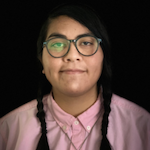Rather than just reading about local plants and their uses, learners can go into the field and experience it for themselves. Native Plants of Hawaiʻi: Exploring Waikīkī was created to inspire inquiry of the local culture and environment, while supporting and enhancing learners’ cognitive abilities. This course seeks to incorporate online, asynchronous learning with a required field day. The online learning orients students to identification knowledge of native plants they encounter and their traditional (historical and contemporary) uses. The physical encounter assists with recall for students’ future application. The dual experience strengthens knowledge from simply “knowing” as they have had physical, active encounters with what they were learning. This session will share relevant, place-based assessment and what that could look like for local learning communities in online courses.
A recording of this presentation is available.
Click the button to the right to access the session archive.

 Kūʻiʻolani Cotchay is a graduate student in the M. Ed. Learning Design and Technology program at the University of Hawaiʻi at Mānoa, where she received a BA in Hawaiian Studies. She is an alternative educator, interested in creating and fostering learning environments external to the typical classroom. Future plans include creating an online Girls Rock Camp, developing educational content for Kānaka Maoli, and obsessing more about Kānaka Color Theory.
Kūʻiʻolani Cotchay is a graduate student in the M. Ed. Learning Design and Technology program at the University of Hawaiʻi at Mānoa, where she received a BA in Hawaiian Studies. She is an alternative educator, interested in creating and fostering learning environments external to the typical classroom. Future plans include creating an online Girls Rock Camp, developing educational content for Kānaka Maoli, and obsessing more about Kānaka Color Theory. Sarah Nakashima regularly looks for strange articles revolving around animals and cults. As a Humanities Librarian at Hamilton Library at the University of Hawaiʻi at Mānoa (UHM), she uses the found information to engage undergraduate students in the research process. Her excitement for student engagement and her desire to broaden the library’s reach motivated her to pursue online learning. Currently, Sarah is finishing as a Master’s candidate in the UHM College of Education, Learning Design and Technology department. Her research focused on incorporating online learning strategies into current library instructional roles.
Sarah Nakashima regularly looks for strange articles revolving around animals and cults. As a Humanities Librarian at Hamilton Library at the University of Hawaiʻi at Mānoa (UHM), she uses the found information to engage undergraduate students in the research process. Her excitement for student engagement and her desire to broaden the library’s reach motivated her to pursue online learning. Currently, Sarah is finishing as a Master’s candidate in the UHM College of Education, Learning Design and Technology department. Her research focused on incorporating online learning strategies into current library instructional roles. Joy Aiwohi is a teacher at Kamehameha Schools Kapalama, and has been teaching at the middle school level for 22 years. She earned a Bachelor of Education degree in Secondary Social Studies and a Master of Education degree in Curriculum Studies from the University of Hawai‘i at Manoa. Joy is in her final year of the Learning Design and Technology M.Ed. Program at the University of Hawai‘i at Manoa.
Joy Aiwohi is a teacher at Kamehameha Schools Kapalama, and has been teaching at the middle school level for 22 years. She earned a Bachelor of Education degree in Secondary Social Studies and a Master of Education degree in Curriculum Studies from the University of Hawai‘i at Manoa. Joy is in her final year of the Learning Design and Technology M.Ed. Program at the University of Hawai‘i at Manoa. Kris Hara is the chief simulation specialist at SimTiki Simulation Center located at the John A Burns School of Medicine in Honolulu, Hawaii. She grew up in Pupukea, HI and earned her respiratory therapy degree from Loma Linda University and Wayland Baptist University. She is currently a masters candidate at the University of Hawaii in Education, learning design and technology (LTEC). Her background as a registered respiratory therapist, pulmonary rehab specialist allowed her to actively engage in patient and staff education and clinical service for many years. In beginning a career in medical simulation in 2006 she fell even more in love with education. As a certified healthcare simulation operation specialist by the Society for Simulation in Healthcare she loves supporting medical students and faculty as the operations director of the simulation lab at JABSOM. Being a part of the LTEC ohana (family) has been a privilege and a joy!
Kris Hara is the chief simulation specialist at SimTiki Simulation Center located at the John A Burns School of Medicine in Honolulu, Hawaii. She grew up in Pupukea, HI and earned her respiratory therapy degree from Loma Linda University and Wayland Baptist University. She is currently a masters candidate at the University of Hawaii in Education, learning design and technology (LTEC). Her background as a registered respiratory therapist, pulmonary rehab specialist allowed her to actively engage in patient and staff education and clinical service for many years. In beginning a career in medical simulation in 2006 she fell even more in love with education. As a certified healthcare simulation operation specialist by the Society for Simulation in Healthcare she loves supporting medical students and faculty as the operations director of the simulation lab at JABSOM. Being a part of the LTEC ohana (family) has been a privilege and a joy! Melissa Kahili-Heede is a final year masters student in the Learning Design and Technology program in the College of Education at the University of Hawaii at Manoa. Melissa is also a librarian at the Health Sciences Library at the John A. Burns School of Medicine, University of Hawaii at Manoa.
Melissa Kahili-Heede is a final year masters student in the Learning Design and Technology program in the College of Education at the University of Hawaii at Manoa. Melissa is also a librarian at the Health Sciences Library at the John A. Burns School of Medicine, University of Hawaii at Manoa. Hongwei Shimizu received BA in Visual Media and MFA in Film & Electronic Media both from AU (American University). She has big passion in teaching, so she also gained Oxford Seminars’ TESOL/TESL/TEFL (100-HOUR) Certificate and Certificate in Greenburg PH.D. Teaching Seminar. Hongwei Shimizu now is a second year LTEC Master student at UH. She hopes she can contribute more and more in the education field of her Visual Media techniques and Multi-languages (Japanese, Chinese, and English) skills.
Hongwei Shimizu received BA in Visual Media and MFA in Film & Electronic Media both from AU (American University). She has big passion in teaching, so she also gained Oxford Seminars’ TESOL/TESL/TEFL (100-HOUR) Certificate and Certificate in Greenburg PH.D. Teaching Seminar. Hongwei Shimizu now is a second year LTEC Master student at UH. She hopes she can contribute more and more in the education field of her Visual Media techniques and Multi-languages (Japanese, Chinese, and English) skills.